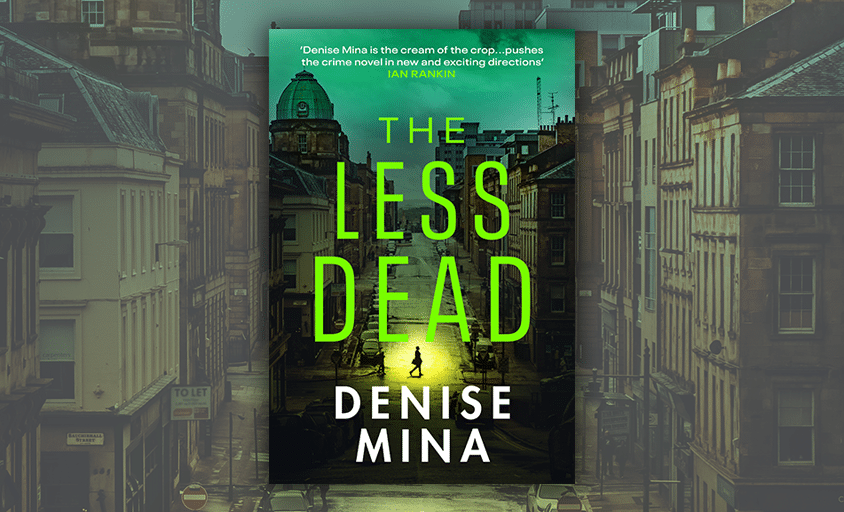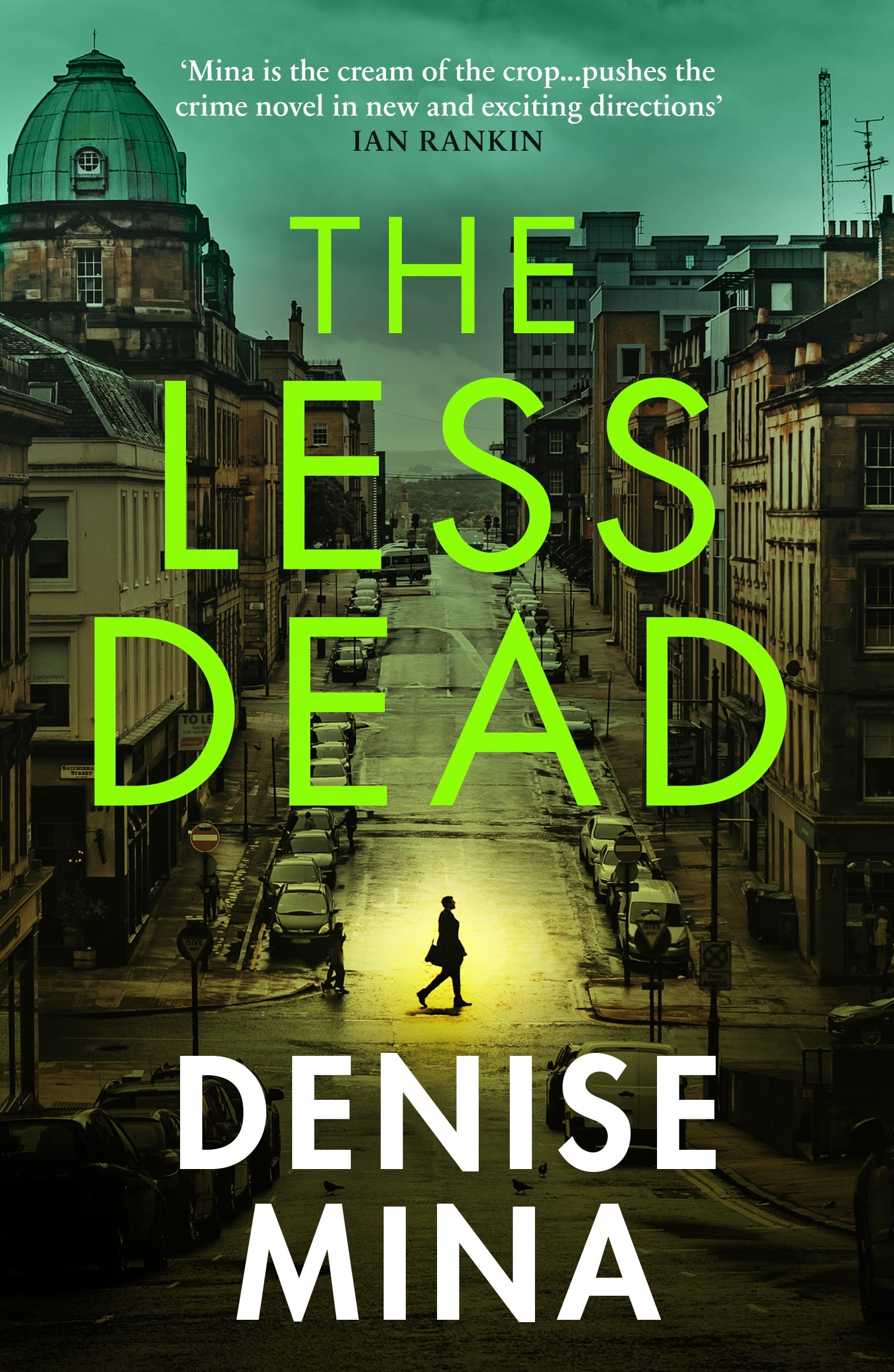Books
Extract: The Less Dead by Denise Mina
Inspired by a series of real murder cases that took place in Glasgow in the 1990s, The Less Dead by Denise Mina is a dark, gritty and atmospheric new thriller from the award-winning author of The Long Drop and Conviction.
When Margo goes in search of her birth mother for the first time, she meets her aunt, Nikki, instead. Margo learns that her mother, Susan, was a sex worker murdered soon after Margo’s adoption. To this day, Susan’s killer has never been found.
Nikki asks Margo for help. She has received threatening and haunting letters from the murderer, for decades. She is determined to find him, but she can’t do it alone…
Read on for an extract from The Less Dead by Denise Mina!
The Less Dead
by
Denise Mina
2
A sudden commotion outside, a shrill voice saying indistinct words and Tracey calling a nervous ‘hello?’ from her office as the new voice cuts high and turns towards the door.
The door is hurriedly opened before Tracey can gallop over from her desk and a very small woman steps into the room and presents herself.
‘Oh my God!’ shrieks Nikki. ‘I can’t believe what you’re wearing, Patsy!’
There’s a lot going on at one time: Patsy is the name on Margo’s birth certificate, the name given to her before she was handed over at two days old. Margo isn’t wearing anything extraordinary, just a cotton shirt and black jeans, so that’s odd. She’s also distracted by Nikki’s voice which is not loud or angry, just a very particular nervous timbre, pitched to be heard over blaring televisions and people screaming at each other. It’s a voice she hears patients use in the surgery, the voice of very anxious people and mothers who can’t control their kids.
‘Hello?’ says Margo. ‘Are you Nikki?’
‘Is that you?’ says Nikki.
They examine each other with the bold regard of small children meeting for the first time.
They look nothing alike. Nikki is small and blonde and underweight. Margo is tall with thick black hair, deep-set brown eyes and pearlescent skin.
Nikki’s clothes are strange, she looks as if she is wearing a costume. Everything she has on is brand new and slightly too big for her: an immaculate grey trackie top straight from the packet, cuffs rolled up, matching lumpy trackie trousers. Over the pristine grey she wears a beige overcoat with a dangling cloth belt that has never been tied. She looks as if she’s had an accident and been given someone else’s clothes to wear home. Such plain clothes don’t really fit on a woman like Nikki because she’s strikingly good-looking. She has good bones, she’s graceful and moves with the consciousness of her core that dancers sometimes have: Margo is struck by the slow ease of her long neck, her spine snakes as she slides into the room, her hand movements are eloquent. None of it seems affected either but unconscious and natural.
Her blonde hair is pulled back tight to the nape of her neck. She wears no jewellery and her face is heavily powdered, like the first frame in a YouTube make-up tutorial. Margo thinks it was because she was coming to meet her. It wasn’t. She’ll soon find out that Nikki has been in court all day and her dull, asexual appearance is a pointed message to old acquaintances and adversaries that her life is very different now, that she is very different now.
She’s trembling with nerves but glides across the room, places her arms around Margo’s upper arms and gives her an awkward, obligation-hug. Margo is suddenly afraid that Nikki might cry. She sees a lot of emotional displays in the surgery and knows that expressions of emotion and depth of feeling are not the same thing, that sometimes they’re opposites. She’s suspicious of big dramas and, if she’s being honest, finds them a bit vulgar.
Not knowing what else to do, she reciprocates the hug, keeping ahold of Nikki for slightly too long. Reticent, they both bend away from the embrace, keeping their faces clear and throwing themselves off balance so they have to sway from foot to foot like crabs having a fight.
Finally they let go and look again. Margo suddenly sees her own face.
She sees deep-set brown eyes and a pointed chin. She sees good skin under all that powder and stray eyelashes in the inner corner of eyes that mirror her own. She sees things she has never noticed about herself before: eyebrows that threaten to arc into a Ming the Merciless point in the middle, an uneven lip fold.
Margo looks at these echoes of her own face and feels herself change. All the splinter-Margos come together and form a whole, taking up more space in the room. She is a balloon being blown up for the first time, a line drawing becoming three-dimensional.
Nikki sees the likeness too. For a still moment there is nothing in the room but two sets of the same eyes, drinking each other in.
They sit down with their knees touching, Nikki on the sofa, Margo on the office chair. Tracey takes a seat further along the sofa and sits back, a referee giving the fighters room to hurt each other, smiling and tipping her head in a way that feels phoney. Margo senses that she isn’t quite wishing them well and tries to bring Tracey into the conversation.
‘Weren’t you about to shut?’
‘Totally happy to wait on.’ Tracey gives a slow blink, showing she is being patient but says to Nikki, ‘You are nearly two hours late.’
‘Got caught up.’
Margo asks, ‘In what?’
‘Stuff. I’s waiting for a thing to start,’ says Nikki, ‘but they’ve never called it and they’ve never said they weren’t going to call it until like ten minutes ago. I couldn’t know.’ She shakes her head as if she can’t be bothered talking about that and looks at Margo’s hair. ‘Our Susan had mad big hair like that. Thick black hair. That’s how she got her nickname. “Hairy” they called her.’
Margo grimaces. Hairy is old-lady derogatory Glaswegian slang for a rough, low-class girl. It’s a hangover from Edwardian times when low-born girls didn’t wear hats. Nikki can see that Margo doesn’t like it.
‘No, I know,’ she says, yanking her coat shut defensively. ‘I know calling her Hairy isn’t very nice but we all had daft names back then, it was how it was. They used to call me “Goofy”. My teeth used to stick right out.’ She salutes from her top lip, showing Margo what they used to be like. Margo only now notices that she has false teeth. ‘Yeah. Got smashed out by a boyfriend.’ Nikki flinches, knowing she’s getting everything wrong. ‘I mean, thanks actually, because he’s done us a favour in a way.’ She looks at Margo imploringly.
‘What was Susan like?’
‘Wee. Smart as a whip. Funny…’ She smiles at the memory of her young sister but her expression collapses, suddenly desolate, and her eyes well up. She whispers, ‘She was awful bad with the drugs. Heroin. She was small. She never had a chance,’ and blushes, blinking back tears as her eyes dart back and forth to Margo, taking her in by bits: hair, clothes, posture, handbag.
This isn’t going very well. The class divide between them is glaring and it shames Nikki. It’s a source of intense discomfort to Margo too, because she doesn’t like to think about class or how privileged she is. She just thinks she’s normal.
There are scars between the knuckles on the back of Nikki’s hands, emphatic white against the pale pink skin, healed track marks: white station stops on a map of her circulatory system. She has been injecting but stopped a long time ago. She doesn’t have the sleepiness of a methadone user or the drowsy disgust of someone on Valium. She doesn’t seem to be on anything else.
‘I was so sorry to hear that she had died.’
Nikki drops her hands and nods and says, ‘Awful sad.’
Margo suspects a heroin overdose. Glasgow suffered an epidemic of overdoses in the years around her birth and now she’s seen Nikki’s hands it seems even more likely. She hopes it is that and not suicide or anything to do with catastrophically poor genetic mental health.
‘You didn’t say how she died in your letters.’
Nikki either cringes or winks. Margo hopes it’s a cringe. ‘I didn’t think it would be right…’
‘Can I ask you something quite frank?’
Nikki nods that it would be OK.
‘Did you have a heroin addiction too?’
Nikki glances at Tracey and suppresses a smirk. It wriggles around behind her lips but her eyes are steely. ‘Why ye asking me that?’
‘Your hands. I know you’ve been using intravenous drugs, I can see that you’re not on anything now.’
Nikki tugs her coat sleeves down and over her hands and tips her chin defiantly. ‘Clean and sober four years.’ Her eyes are angry that Margo asked, more so because it was in front of Tracey.
‘Four years? That’s amazing,’ says Margo. ‘Hard work.’
‘Using is harder work. If you could harness the work ethic of addicts Glasgow would be a paradise.’ Tickled by her own wit Nikki smiles, defensive walls down for a moment.
‘I’ve seen a lot of addicts in the surgery,’ says Margo. ‘I have got some small idea of how momentous what you’ve done is.’
‘You’re a doctor. You’re amazing.’
Margo isn’t really amazing. She’s not coping very well. She had a bit of a breakdown after Janette died and has been avoiding work ever since, afraid to admit to having fragile mental health in case she never gets to work again. So she bats the compliment back, ‘No, Nikki, you’re amazing. Four years is amazing. Thanks so much for coming. And for writing.’
‘But I’ve been writing to you for years and you didn’t reply.’
Margo doesn’t want to blame Janette for hiding the letters but can’t think what else to say. She shrugs. ‘My mum – my other mum. She didn’t pass the letters on. I don’t really know why. She died quite recently and that’s when I found them.’
She expects Nikki to ask about Janette, who was she, did she do a good job bringing Margo up, what was her childhood like, but Nikki doesn’t. Her eyes dart quickly to the side, flicking the unwelcome topic off a mental dishcloth.
‘I was thinking you didn’t want anything to do with me,’ sighs Nikki. ‘But the timing of this couldn’t be better. See how you’re a doctor? The case right now… you can help.’
Nikki waits for Margo to ask about this case right now that is clearly so important to her. She watches Margo’s mouth, slowly nodding. But Nikki didn’t ask about Janette and that’s important to Margo. She’s been waiting for two hours. She doesn’t know why she has to be the compliant one all the time.
‘Anyway, Nikki, I’ve got so much I want to ask. When did Susan die?’
‘What?’
‘How long after I was born?’
‘Not long.’ Nikki is not pleased about the change of subject. Her eyes harden.
‘And she gave me up two days after I was born?’
‘No, she gave you up right away.’ She can see that goes down badly. ‘Look, Susan wanted to keep you, but the way things were… she’d a whole lot of problems, drugs. Bad. So… there it is.’
‘I’m sorry. I phrased that badly. I’m not reproaching anyone.’
Nikki nods and blinks and looks at Margo’s shirt then half smiles and changes the subject, ‘OK, look, I need to ask: are you psychic?’
‘Am I what?’
‘Psychic. There’s a lot of that in our family. Seeing the future, stuff like that?’
‘No, I’m not, I’m afraid.’
‘Oh.’ Nikki is disappointed. ‘Shame, because the sight does run through us, very strong. I wondered if that’s how you became a doctor.’
‘No, I’m, um…’
‘I mean, I’m asking because – see that? What you’re wearing?’ She points at her red shirt and black jeans. ‘That’s a bit psychic. Look –’ She reaches into her shoulder bag and takes out an old yellowed photograph. ‘I brought this to give you. This is Susan.’
She hands her the small picture.
A long time ago Susan Brodie stands in a living room, in front of a sideboard and a painting of an Alpine scene, and grins into a camera. She has a more symmetrical nose than Margo and a twisted right front tooth but she has Margo’s bushy black hair, her eyes, her skin, her face. She wears a silky red shirt with a big collar and a black pencil skirt, like a waitress in a steakhouse. It’s basically what Margo is wearing now. Margo is entranced by the picture.
‘Wow.’
‘I know. See the clothes, see what I mean?’
‘Yeah.’
Nikki giggles, delighted. ‘That’s your mum.’
‘That’s my mum,’ echoes Margo.
They sit with that for a while.
‘That’s for you. You keep that,’ whispers Nikki.
‘Thank you.’
Margo puts it away in an inner pocket in her handbag and sees Nikki’s eyes following it. Giving up the picture is a loss. People didn’t used to take a lot of photos. She thanks Nikki but it doesn’t feel like enough.
‘I’m sorry if I sound dismissive, Nikki, it’s just that I’m a scientist and I don’t really believe in that stuff.’ Her scepticism is not well received. She tries to soften it. ‘Do you think you are psychic?’ She’s wondering if she hears voices.
‘Oh, no,’ Nikki says, serious, ‘I don’t have the gift. It’s just – we really need a doctor and then you are one. I thought you’d known, sort of psychically…’
That statement doesn’t seem to go anywhere.
‘I see,’ says Margo, ‘sorry, it’s just, as I say, I’m a scientist.’
‘Oh, you know everything then.’
They stare at each other unkindly and Margo breaks first. ‘Did Susan know who my dad was?’
Hesitation. ‘Yes.’ Slow blink.
It feels as if Nikki is about to fabricate a lie. There is no father’s name on Margo’s birth certificate.
‘I mean it’s OK if she didn’t –’
‘Barney Keith.’
The name sounds fictional. ‘Right? But she didn’t put that name on my birth certificate.’
‘You wouldn’t want his name.’ Nikki can’t look at her. ‘She’s done you a favour there. He’s probably dead now anyway.’
A coldness settles between them. Margo doesn’t know what she’s done wrong. She wants to know if Susan died of something hereditary but she doesn’t know how to ask now.
‘Poor Susan…’
‘Aye.’
‘I’m so sorry.’
‘Oh aye, yeah. She was it for me. She was my wee sister. She was the world to me and I was it for her. Know what I mean?’
‘How did she die…?’
‘Got murdered.’ She says it carelessly, as if they’re talking about a lost scarf.
‘Murdered?’
‘Yeah. There was a lot of that back then.’
‘Oh? Back – when is this we’re talking about?’
‘Aye… late eighties, early nineties. Lot of it.’
‘I’m so sorry, I didn’t know. Who murdered her?’
‘A stranger off the street.’
‘Oh God, how awful, I’m so sorry.’
‘I know who it was, I know where he lives, I know what he did, I just can’t get him.’
‘Oh!’ This is what she was hinting about in her letters, this is the Jack the Ripper stuff. Margo wants to steer her away from it. ‘Well! What else can you tell me about Susan herself? Was Susan tall?’
‘No. ’Bout five foot three.’
‘Did she do well at school?’
‘No.’
‘Did she like to read?’
‘No.’
This isn’t going well. Margo thinks Nikki might like to talk about herself. ‘Do you have children of your own, Nikki?’
‘Ah no, sadly.’
‘Did you want children?’
‘Of course I did. I’m normal.’
Quite an odd reason to have children but Margo has patients who’ve had kids for less cogent reasons.
‘When did Susan –’
‘Look, this is a whole lot of questions,’ says Nikki, blinking nervously. ‘I thought we were just going to meet each other.’
‘Sorry.’
‘’S OK but – it’s a lot. Today has been – a lot.’
‘Fair enough. Thank you so much, again, for the photograph. It means a lot to me.’
‘You’re welcome. Can’t believe your hair is her hair.’
‘I’ve never seen anyone else with my hair before.’
‘I know, me neither, it’s unique! That’s what she used to say. Unique!’
Confident that the meeting is going smoothly, Tracey stands up and says that the office is about to shut but maybe they’d like to stay on for a wee fifteen minutes or so and have a cup of tea? It’s very kind of her. She’s already staying late, past the end of her shift, hoping that the meeting can be salvaged. Mindful of this, Margo says no thanks but Nikki says oh, aye, please, she’s dead thirsty. Tracey goes off to get it, leaving the door ajar.
Nikki watches her leave, keeping her eyes on the corridor as she whispers urgently to Margo:
‘She was murdered by Martin McPhail. They never got enough on him, but you and me, you being a doctor, we can catch the fucker.’
Margo blinks. In the distance she can hear a kettle boiling.
Enjoyed this extract from The Less Dead by Denise Mina? Let us know in the comments below!



Please note: Moderation is enabled and may delay your comment being posted. There is no need to resubmit your comment. By posting a comment you are agreeing to the website Terms of Use.